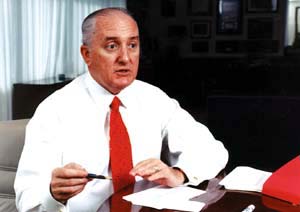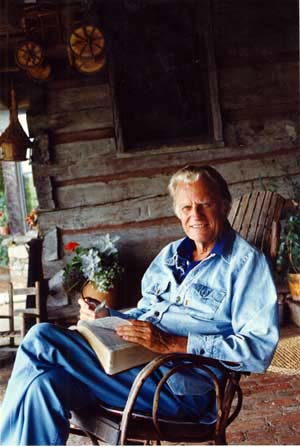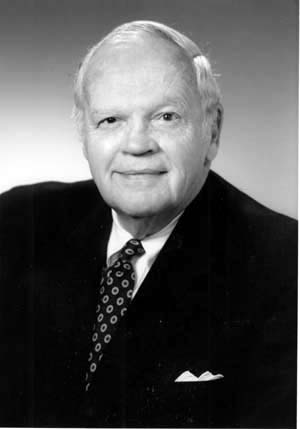|
Events

Prescription for Success
A new format and an appearance by GSK's
Bob Ingram
could be just the tonic the stately Annual Meeting needs
By Kevin Brafford
Some folks retire and kid around about being as busy as ever. Bob Ingram
(above) retired
at the end of last year and — no joke — is as busy as ever. Ingram, the former No. 2 executive at giant GlaxoSmithKline and for years the
most visible pharmaceutical industry leader in the Triangle, turned 60 in
December, the mandatory retirement age for GSK executives. But while his
day-to-day duties have changed, his appointment book still overflows as he
continues to represent the company as a part-time chair and special adviser.
“Some of my friends tell me I flunked retirement even before I started,” he
quips.
One of Ingram’s appointments has him at the Raleigh Convention and Conference
Center on Wednesday, March 19, where he’ll deliver the keynote address at
NCCBI’s 61st Annual Meeting.
It’s a day when, in keeping with tradition, two individuals are honored by
NCCBI for their lasting contributions to North Carolina. This year the honorees
are the Rev. Billy Graham, who will receive the Citation for Distinguished
Public Service, and John F. McNair III, former president and CEO of Wachovia
Corp., who will receive the Citation for Distinguished Citizenship. Because of
health reasons, Rev. Graham will be unable to be present.
But in a break from tradition, both awards will be presented during the luncheon
and just prior to Ingram’s address. To shorten the day, there will be no
formal sitdown dinner; instead, festivities will close with an expanded
reception from 5 to 7 p.m. “We asked our members how we could improve the
Annual Meeting, and the response from many was that they’d like to be finished
and on their way home earlier,” says NCCBI President Phil Kirk. “We feel
like this is a change for the better — that we’re establishing a new
tradition.”
The remainder of the Annual Meeting will continue along familiar paths. The day
begins with a board of directors meeting from 10 to 11:45 a.m. Beginning at 11
a.m. and lasting until 7 p.m., members and guests can tour the largest-ever
NCCBI Expo, a trade show complete with more than 80 booths. The luncheon, during
which outgoing chair Jim Hyler of First Citizens Bank passes the gavel to Sue
Cole of U.S. Trust, is from 11:45 a.m. to 2 p.m., followed by what promises to
be two interesting seminars: “State Budget Issues: Opportunities &
Challenges” from 2:15 to 3:30 p.m., and “Business Ethics at Work” from
3:45 to 5 p.m.
“It’s a day when the best and brightest business and political minds in our
state come together for what many consider the most important business meeting
of the year,” says Kirk. “We are thrilled to have Bob Ingram as our keynote
speaker, and just as thrilled to honor two men who have meant so much to North
Carolina — Rev. Billy Graham and John McNair.”
Ingram says he welcomes the opportunity to speak at the Annual Meeting, because
he’ll have access to an audience guaranteed to be attentive. “In stepping
down from the day-to-day duties as CEO, one of the things I’m most looking
forward to now is being a spokesman for our industry,” he says. “Knowing
that the audience that day will be comprised of business leaders around the
state who all have to manage a bottom line, who all recognize and appreciate why
there is real value in paying for good pharmaceutical care, is appealing.”
Ingram says his reputation as a gifted and eloquent speaker is largely
undeserved and that his words flow easily because he speaks from the heart. “I
don’t think we have done a good job of explaining in real terms the value the
research-intensive pharmaceutical industry provides to society,” he says.
“More and more, pharmaceuticals are singled out as being part of what’s
wrong because costs have escalated so much. But the fastest growing segment of
American society is 85 years and up, and that’s because of the advances
we’ve made.
“The only hope for people with diseases like cystic fibrosis and Alzheimer’s
is people and companies who are willing to invest large sums of capital at high
risk. We all know someone who has benefited from medical advances, just as we
all know someone who would have benefited had these advances been available
years ago.”
Ingram has worked in pharmaceuticals since 1965, the year he graduated from
Eastern Illinois University with a major in business administration and a minor
in chemistry. He went to work selling pharmaceuticals for William S. Merrell
& Co. He was responsible for 43 counties in downstate Illinois, and he spent
the next 30 months getting to know country doctors in those small towns. “It
taught me a lot about developing customer relationships,” he says. “Each
town had just a few physicians.”
Ingram remained with Merrell for 20 years, along the way moving from his sales
rep job to a hospital rep position in St. Louis. In those later years one of his
responsibilities involved testifying before Congress, and it was in Washington
where he displayed that business savvy and political skills that piqued the
interest of rival Merck & Co.
In 1985, Ingram accepted Merck’s offer to become vice president of government
affairs. Five years later, Glaxo Inc. came calling. While satisfied at Merck,
where he was now president of Merck Frosst Canada Inc., Ingram knew plenty about
the young American division of Glaxo plc. His oldest of three sons, Michael, was
a sales rep for the company. “I like to say that my son did so well they
decided to take a chance on me,” he quips.
In the decade that followed, Ingram oversaw remarkable growth at Glaxo, which
later would become GSK. He was named executive vice president in January 1993,
president and COO in June 1993, president and CEO in March 1994 and chair in
January 1999.
As Ingram’s 60th birthday approached, GSK executives discussed waiving the
company’s mandatory retirement, which Ingram found flattering yet not worth
pursuing.. “Overall, it’s not a bad policy,” he says. “It ensures that
you put a proper focus on succession plans, which is vital for a company
that’s owned by shareholders.”
Further, he knew he wouldn’t be lacking for things to do. He continues to
serve on many corporate boards, is president of the American Cancer Society
Foundation, and lends his efforts to numerous fund-raising opportunities.
Through it all, he remains cognizant of his industry’s public relations
challenges and feels charged in “leading an effort to better explain what we
do and the benefits of doing it.”
There’s at least one perk to Ingram’s “retirement.” His office is no
longer in RTP; his new digs provide an upper deck-like view from beyond the
outfield at Durham Bulls Athletic Park. An avid baseball fan, he’s hoping the
improved accessibility allows him to attend more games.
 Billy
Graham (left) has been our nation’s leading religious revivalist for more than 50
years. Born Nov. 7, 1918, near Charlotte as the first of four children to
William Franklin and Morrow Coffey Graham, his family regularly attended
Associate Reformed Presbyterian Church. At age 16, he attended a series of
revival meetings led by evangelist Mordecai Fowler Ham that levied charges of
moral laxity at a local high school. Graham felt led by Ham’s words and
dedicated himself to the ministry from that day forward. Billy
Graham (left) has been our nation’s leading religious revivalist for more than 50
years. Born Nov. 7, 1918, near Charlotte as the first of four children to
William Franklin and Morrow Coffey Graham, his family regularly attended
Associate Reformed Presbyterian Church. At age 16, he attended a series of
revival meetings led by evangelist Mordecai Fowler Ham that levied charges of
moral laxity at a local high school. Graham felt led by Ham’s words and
dedicated himself to the ministry from that day forward.
His rise in popularity was steady, and his influence was never more evident than
in 1957, at age 38, when two million people attended a 16-week crusade at
Madison Square Garden in New York. That same year, Graham’s led the
country’s first televised revival.
Graham moved with the spirit of the age, and in the 1980s he became a preacher
of world peace, urging reconciliation with Russia and China, where his wife
Ruth, the daughter of missionaries, was born.
One of his most visible moments may have been in 1991 when he appeared at
President Bush’s side, his Bible in hand, as the United States opened war
against Iraq. The elder Bush wasn’t unique among presidents in consulting with
Graham — Eisenhower and Kennedy had begun the tradition decades earlier —
but Johnson, Nixon and Ford grew the relationship that concluded with Bush’s
naming him “America’s pastor.”
Two years later, eight days after his 75th birthday, Graham graced the cover of
Time, the magazine that later named him one of the 100 most important people of
the 20th century. In May 1996, he and Ruth were presented with the Congressional
Medal during a ceremony in Washington. He has also appeared on the covers of
Newsweek, Life, U.S. News & World Report, Parade and various other
magazines.
Graham is regularly listed by the Gallup organization as one of the “Ten Most
Admired Men in the World,” and Gallup described him as the dominant figure in
its poll since 1948 — making an unparalleled 44 appearances, including 37 in a
row. He has written 23 books, many of them top sellers, and his latest, Just As
I Am, published in 1997, achieved a “triple crown,” appearing simultaneously
on three top best-seller lists in one week.
Since 1945, the Grahams have lived in Montreat. The couple has five children:
Virginia Leftwich, Anne Morrow, Ruth Bell, William Franklin and Nelson Edman; 19
grandchildren and numerous great-grandchildren.
 McNair’s
life and career developed from the modest town of Laurinburg to the whole of
North Carolina. At Davidson College, McNair (left) earned a nickname based on his fondness
for ice cream — “Double Dip” — as well as for his contributions to the
football team and the Davidsonian, the school’s newspaper. McNair’s
life and career developed from the modest town of Laurinburg to the whole of
North Carolina. At Davidson College, McNair (left) earned a nickname based on his fondness
for ice cream — “Double Dip” — as well as for his contributions to the
football team and the Davidsonian, the school’s newspaper.
His business reputation grew in his native Laurinburg in the 1950s and 1960s as
he ran several small businesses and then headed the family bank upon the death
of his father in 1966. Two years later, The State Bank merged with Wachovia and
he remained with the larger bank, accepting increasingly larger
responsibilities. Known for maintaining tight budgets — regardless of the
economy — and a small-bank, customer-friendly philosophy, he eventually became
president and CEO of Wachovia Corp.
From that rank his reputation as an astute banker and shrewd business man grew
throughout the state and Southeast. With it came additional responsibilities and
numerous honors, and he eventually served as president of the North Carolina
Bankers’ Association and chair of its legislative committee.
Equally impressive have been his civic contributions to the state. He has
maintained decades of interest in Wake Forest University, Peace College and
Davidson, where he served as an alumni-elected trustee and received its
Distinguished Alumnus Award. He was a member of the State Highway Commission and
the Board of Economic Development. In Winston-Salem, he has been a director of
numerous business and charitable organizations.
The afternoon seminars will examine two hot-button issues — the state’s
budget deficit and business ethics. “Both seminars will address issues that
are ‘in the news,’ ” says Leslie Bevacqua, NCCBI’s vice president of
governmental affairs. “These are lively, interesting topics that are sure to
spark plenty of discussion.”
Darleen Johns, president and CEO of Alphanumeric Systems Inc., will moderate
“State Budget Issues: Opportunities & Challenges.” Its panel includes
Dan Gerlach, Gov. Mike Easley’s senior policy adviser for fiscal affairs; Tom
Ross, executive director of the Z. Smith Reynolds Foundation and chair of the
Governor’s Commission to Modernize State Finances; and Hyler, chair of
Governor’s Commission to Promote Government Efficiency and Savings on State
Spending.
“Just as private sector companies have to make tough, strategic decisions to
remain competitive, North Carolina’s policy makers must consider
competitiveness, efficiency and simplicity in the decision-making process,”
Bevacqua says. “This panel will give valuable insight to NCCBI members about
what we can expect during this session of the General Assembly as it relates to
the budget.”
Dr. Julianne Still Thrift, president of Salem College, will moderate “Business
Ethics at Work,” which will include panelists A.P. Carlton, president of the
American Bar Association; Bill Johnson, president and CEO of Progress Energy
Service Co.; and Catherine LeBlanc, consultant and trainer to the Kenan
Institute of Ethics at Duke University.
“Business ethics has received lots of attention in the media recently,” says
Bevacqua. “These panelists will address many of the issues that are being
raised in boardrooms across the state and around the country. They’ll also
discuss effects of the federal Sarbanes-Oxley Act that was passed last year, and
how businesses of all sizes are looking at ethics.”
A constant throughout the day will be the NCCBI Expo, which will highlight more
than 80 businesses and organizations across the state, including convention and
visitors bureaus, technology companies, advertising firms and education
organizations.
“We’re expecting it to be the largest in NCCBI history,” says Expo
coordinator Julie Woodson. “The response has been exceptional. We look forward
to providing exhibitors an excellent marketing opportunity, and providing
attendees with a trade show that will help them learn more about products and
services that are offered in North Carolina.”
For the second consecutive year, Goodness Grows in North Carolina (a part of the
N.C. Department of Agriculture and Consumer Services) will showcase a variety of
booths featuring foods and products that are grown instate. This year, for the
first time, the N.C. Grape Council will display some of the state’s wineries.
The Expo will be a focal point for the 5 to 7 p.m. reception, which will take
place in the exhibit hall. “Exhibitors will get maximum exposure during the
reception,” Woodson says, “and throughout the day they will have the
opportunity to establish contacts with more than 1,000 potential customers. This
is definitely the tradeshow that businesses should put on their calendars to
exhibit their products and services.”
The cost to exhibit at the Expo — and a few booths remain — is $325 for
NCCBI members and $450 for non-members. Those interested in exhibiting should
contact Woodson at 919-836-1402 or jwoodson@nccbi.org.
Tickets to the Annual Meeting are the same as last year — $50 for the luncheon
and $80 for the reception. For information on ordering tickets, check our web
site at www.nccbi.org.
Return to magazine index
|